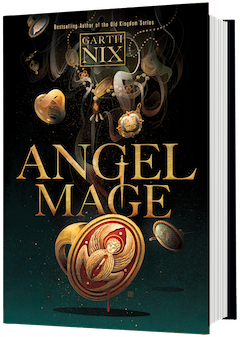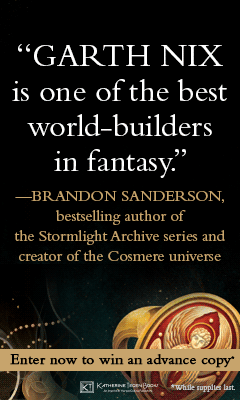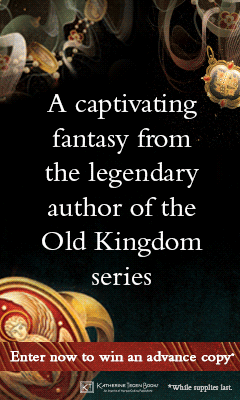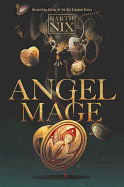Angel Mage
by Garth Nix
Garth Nix, the bestselling author of the young adult Old Kingdom series, pays homage to Alexandre Dumas's The Three Musketeers in this sweeping fantasy narrative about requesting, using and harnessing the power of the heavens. Angel Mage introduces a vast world of power structures--both angelic and human--then pushes their boundaries past the breaking point. Nix's elaborately detailed universe is inhabited by captivating, fully fleshed characters whose lives and ambitions dangerously intertwine.
Epic in scope and size, Nix's Angel Mage takes place in a world in which physical symbols of heavenly powers (icons) can be used by humans to connect with any in several pantheons of angels. The prologue drops readers into the fall of the nation of Ystara as a plague of angelic magic rampages, killing some Ystarans through a disease called the "Ash Blood" and turning all the rest into "monsters while they still live." The Cardinal used her icon to call upon Palleniel, the Archangel of Ystara, "on the first day, when the King began to bleed ash," in hopes the angel would stop the plague. "Palleniel answered but would not do [her] bidding" because, he said, "another commanded him now." As the country devolved into bloody chaos, the neighboring Archangels--"Ashalael of Sarance in the north and Turikishan of Menorco in the south"--closed the Ystaran borders "to all heavenly beings," meaning none of Palleniel's pantheon of angels, the newly created beasts nor the Ash Blood plague could leave the country.
A small group of people, the followers of a lesser-known, potentially heretical charter called Palleniel Exalted, escaped the slaughter by following their leader, Liliath, the Maid of Ellanda, into Sarance. Liliath "had been an incredible young woman, astonishing the world with her ability to make icons and channel angels from childhood." It was rumored that she "was uniquely able to avoid the cost of calling upon angelic powers"--that is, rapid aging based on the strength of the angel--and it was whispered she may have "somehow corrupted Palleniel," drawing him away from the country's aid and even bringing about its destruction. No one knows for sure, though, and Liliath disappeared soon after the Ystarans crossed into Sarance.
Over a century later, Liliath wakes "in total darkness with cold stone under her." A voice tells her "that which you waited for has occurred, and so I awake you," informing her that four "suitable candidates" are ready. "But there should be hundreds..." Liliath protests, furious that "her plans--her destiny--should once again go awry." She calms herself by thinking, "four should be enough. Even one might suffice...." Liliath does not yet know that she has awoken to a world in which all descendants of Ystara--all those born of the people she helped escape--are treated as an underclass. Because angelic magic used on them always results in either death from the Ash Blood plague or mutation into a beastling, they are called "Refusers" and forced to wear gray for easy identification.
Liliath's four suitable candidates are also lacking information, oblivious to Liliath's machinations and unknown to each other. All four are beginning their adult lives in Sarance, seeking higher education, well-paying jobs or glory. Sarance is now a wealthy nation ruled in the same way Ystara was: a Queen, her chosen King by her side and an angel mage Cardinal who speaks directly with the country's Archangel to help govern. The different armed groups that serve the Queen and Cardinal are, like the rulers, regularly at odds with each other, with Captain-General Dartagnan and her Musketeers siding with the Queen, while Captain Rochefort and her Pursuivants (angel mage "soldiers and secret agents") protect the Cardinal and her interests. Into this hierarchical structure step Simeon MacNeel, "a student of medicine"; Agnez Descaray, "a cadet of the Queen's Musketeers"; Henri Dupallidin, "a clerk in the service of the Cardinal"; and Dorotea Imsel, "an icon-maker." The four young people are placed into residences in Sarance's Tower of London-like Star Fortress, either through happy circumstances--Agnez is a Musketeer, Henri has been promoted--or through dangerous connections--Simeon is under investigation for a dangerous encounter with a beastling, Dorotea is being held as a "guest" of the Tower because she has magic skills considered heretical. There, the four meet each other, discovering an immediate connection, and begin a journey they did not want to undertake for a goal they cannot understand.
Nix's tribute to Dumas is a captivating work, perfect for readers who want a hefty fantasy. Nix's author letter says that he wanted his "world to have gender equality" and, so, where Dumas's work assumes all people must be white men, Nix's places women and people of color at the heart of power--women are running countries, leading armies, fighting with the Musketeers and bringing about the end of all humanity. Angel Mage is wholly entertaining and likely to stay with readers for quite a while after they've finished. And it is simply wonderful to see so many bad-ass intelligent, talented, magical women prop up the world and threaten to take it down. --Siân Gaetano, children's and YA editor, Shelf Awareness








